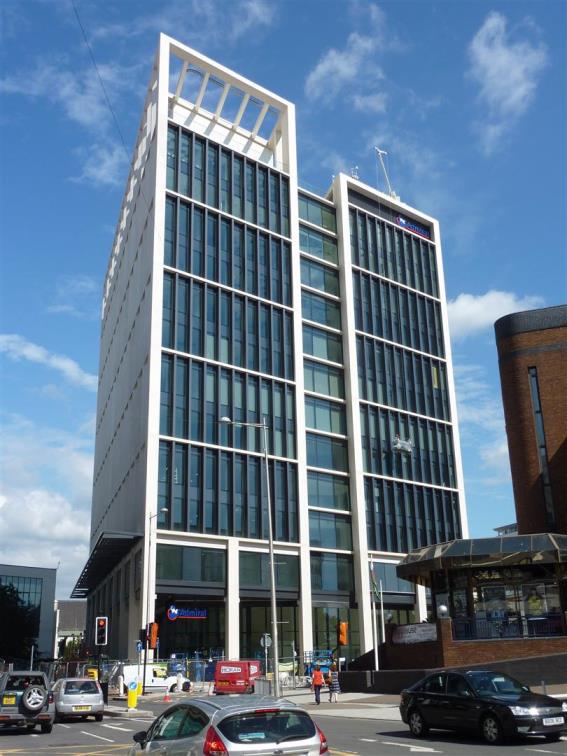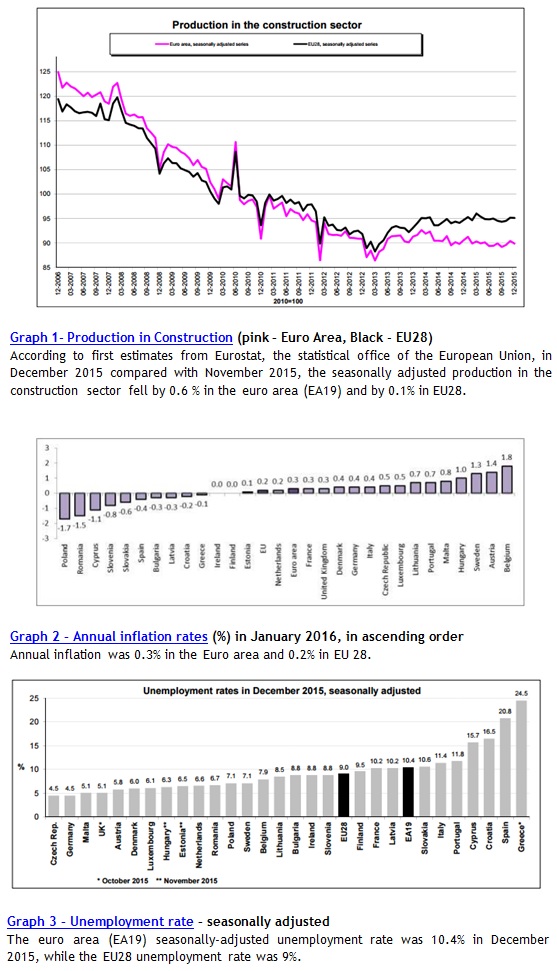Concrete Perspectives February 2016
Construction Sector
- On 1 February 2016, the European Commission Joint Research Center (JRC) Institute for Energy and Transport (IET) published a report entitled “Synthesis Report on the assessment of Member States’ building renovation strategies”.
- According to the European Committee for Standardization (CEN) website, the Technical Committee on Cement and building limes (CEN/TC 51) is currently approving a revision of the standard on “Methods of testing cement – Part 3: Determination of setting times and soundness” (prEN 196-3 rev). The standard (EN 196-3:2005+A1:2008) specifies the methods for determining standard consistence, setting times and soundness of cements.
- On 4 February 2016, the European Commission DG GROW published a study entitled “Simplification and mutual recognition in the construction sector under the Services Directive” which provides a legal analysis of authorisation schemes for construction service providers and their respective conditions for providing construction services in 14 selected Member States (MS) in the context of the Services Directive.
The study referred to the construction of a one-floor 2 bedroom house and a 10-floor office building as case-studies. Note that it did not refer to rules on the use of building materials and waste management.
Main findings of the study:
- 6 out of the 14 selected MS impose so-called ‘horizontal authorisation schemes’ controlling access to the market, varying greatly in conditions imposed, and in most cases applicable without regard for the cross-border element of service provision.
- In the context of those horizontal schemes but also in relation to building permits, common to all MS States, the study found a frequent duplication of a priori controls, a major lack of mutual recognition of equivalent requirements previously complied with, significant administrative burden, and equally restrictive controls and conditions for temporary cross-border provisions as compared to establishment cases.
- Voluntary certification schemes are largely inoperable in enhancing mutual recognition given the complexity and diversity of national standards.
- Stakeholders emphasized the lack of available and user-friendly information on applicable requirements and the complexity of such requirements as major obstacles to cross-border operations
Recommendations from the study:
- Horizontal authorisation schemes should be rare, and when they do exist, should result in simplified building permits.
- Mutual recognition and self-certification should also operate to limit controls, particularly building permits, to a minimum, with extensive use of tacit approval or even mere prior notifications.
- Simpler document requirements, full electronic procedures and comprehensive and user-friendly information should be put in place.
- Background: Directive 2006/123/EC (Services Directive) aims to remove barriers to trade in services in the EU by simplifying administrative procedures for service providers, enhancing the rights of consumers and businesses receiving services and fostering cooperation among EU countries. In its scope, the directive covers a wide range of services including the activities of most regulated professions such as architects and engineers but also construction services.
- The European Committee for Standardisation (CEN) published the list of free 30-minutes webinars taking place one a month throughout 2016:
– CEN-CENELEC contribution to the drafting of a Standardization Request
10 March – 10:00 (CET) to 10:30 (CET)
Scope: click here
– CEN-CENELEC response to a Standardization Request
12 April – 10:00 (CEST) to 10:30 (CEST)
Scope: click here
– CEN-CENELEC in Horizon 2020
10 May – 10:00 (CEST) to 10:30 (CEST)
Scope: click here
– Dissemination of CEN and CENELEC homegrown standards for adoption in partner countries and regions
10 June – 10:00 (CEST) to 10:30 (CEST)
Scope: click here
– Horizontal / cross-sectoral standardization activities
9 September – 10:00 (CEST) to 10:30 (CEST)
Scope: click here
– Role of New Approach Consultants – including self-assessment
10 October – 10:00 (CEST) to 10:30 (CEST)
Scope: click here
– Soft skills development for Technical body chairs and convenors
10 November – 10:00 (CET) to 10:30 (CET)
Scope (shortly available)
– Standardization for Services
9 December – 10:00 (CET) to 10:30 (CET)
Scope: click here
Please click here to register to any of the webinars.
Live from the European Union
The Commission presents sustainable energy security package
On 16 February, the European Commission issued a Sustainable Energy Security Package. The aim of the package is to improve energy security through closer EU coordination.
In its speech, commissioner Miguel Arias Cañete said, that the EU would need more gas infrastructure and gas imports even if it met its climate and clean energy goals.
The package lists several measures to strengthen the EU’s resilience to gas supply disruptions. The measures consist of:
- moderating energy demand,
- increasing energy production in Europe (including from renewables),
- developing a fully integrated internal energy market,
- diversification of energy sources, suppliers and routes
The package also included strategy documents on heating and cooling and on developing liquefied natural gas (LNG) capacity.
As for the heating and cooling strategy, it lists a number of measures the Commission will consider in the future, as part of the reviews of the Energy Efficiency, Energy Performance of Buildings and Renewable Energy Directive, and electricity market reform.
While the Strategy acknowledges the importance of a more efficient heating and cooling systems, and the importance of shifting energy demand from peak times, it fails to put emphasize on the reduction of the overall energy demand in buildings.
At the same time, the strategy realises that split incentives are one of the main barriers of building renovation and recognises that different building ownerships require different measures. Furthermore, the proposal also identifies the lack of training for building professional as a key issue and plan further actions to tackle the skills shortage within the platform BUILD UP.
The Commission also plans to promote the use of renewable energy in different applications such as renewable heating and increasing the deployment of renewable energy in district heating and combined heat and power.
Under the ‘smart finance for smart buildings’ initiative the Commission encourages Member States to establish one-stop shops for low-carbon investments, including advisory services and finance.
European Commission – Press Release
EuroAce – Press Release (European Alliance of Companies for Energy Efficiency in Buildings)
High-Level Conference on Energy intensive industries
On Monday 15 February, the European Commission held a High-level conference on energy intensive industries (agenda).
In its opening speech Vice-President and Commissioner Jyrki Katainen stated that the competitiveness of the European energy intensive industries is crucial and expressed the commission’s support for these industries.
Executives from the steel, aluminium, refining and cement sectors asked for policy support and expressed their concerns over the high, not-competitive energy prices in Europe.
To read the whole article, please contact the BIBM Secretariat: info@bibm.eu
World Economic Forum report: Intelligent Assets: Unlocking the Circular Economy Potential
On 8 February 2016, the World Economic Forum (WEF) published a report entitled “Intelligent Assets: Unlocking the Circular Economy Potential” which illustrates opportunities for innovation and creativity across a spectrum of industries and sectors and looks notably at how we build and transform our buildings in chapter 4 from pages 29 to 30.
National Award Winners
UK Project Award – Thorp Precast for Admiral Headquarters
The 2015 Project Award was presented to Thorp Precast for their design and manufacture of precast concrete for the new Admiral Headquarters in Cardiff, Wales. Thorp used white Portland architectural precast concrete cladding with a high-quality surface finish featuring slightly exposed natural limestone aggregates for the 11 storey building.
The building is a BREEAM ‘Excellent’ 240,000 sq. ft. headquarters and call centre including three mixed-use retail units and underground car parking.

News in brief

Agenda
MARCH
1 March
ECP Workshop Thermal Mass
Madrid, Spain
2 March 2016
ECP Public seminar on Thermal Mass
Madrid, Spain
2 March 2016
BIBM Technical Commission
Brussels, Belgium
7 March 2016
Concrete Initiative
Brussels, Belgium
9 March 2016
BIBM Environment Commission
Brussels, Belgium
15 March 2016
CPE Sustainability WG
Brussels, Belgium
16 March 2016
CPE CPR WG
Brussels, Belgium
22 March 2016
CPE Event Parliament
Brussels, Belgium
24 March 2016
European Masonry Alliance
Conference call
APRIL
15 April 2016
Notified Bodies SG 13
tbd
19 April 2016
BIBM Board meeting
Brussels, Belgium
21 April 2016
CEN/TC 229/WG 1
Brussels, Belgium
MAY
3 May 2016
BIBM Communication Commission
Cologne, Germany
4 May 2016
CEN/TC 104/TG 20
Paris, France
10-11 May 2016
CEN/TC 104/SC 1
London, UK
11-12 May 2016
CEN/TC 104
London, UK
10 May 2016
Fire Safe Europe Task Force
Lund, Sweden
20 May 2016
Concrete Initiative
Brussels, Belgium
24 May 2016
CPE TG CPR implementation
Brussels, Belgium
26-29 May 2016
IPHA Congress
Budapest, Hungary
